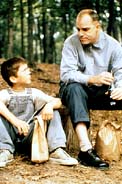
There is that rare moment when the lights go down and cinema magic
happens; this film is one of them. The journey which begins with the heart-
wrenching story of Karl Childers (Billy Bob Thornton) as he tells of the
gruesome murders he committed as a child (while we almost imperceptibly
hear his heartbeat in the background) will leave no one untouched by the
time his entire story is revealed. Very much like life, it has twists and turns
without any obviously predictable events. There is humor, compassion, and
friendship tied up in this tight little bundle that will grab you and take you, as
few films do nowadays, through a catharsis that knocks the hell out of you.
Sling Blade
© RCV Film Distribution

|
Karl Childers (Billy Bob Thornton) is a mildly retarded man who suffered
severe punishment at the hands of his fanatically religious parents.
Responsible for a double homicide, including matricide, he is only now about
to be released from the institution that has confined him for twenty-five years.
With trepidation and a few initial minor snags, he quickly adapts to the people
around him and becomes an accepted member of his new community.
Although slightly retarded, his insights and understandings are often clear.
His perceptions are less confused than some might believe and his
conclusions often more direct and quickly drawn those of someone with rote-
learned patterns of behavior. Karl reacts more instinctually than most, but
often responds after deep consideration. He believes in justice and
righteousness, and comprehends most of what is written in the bible.
Walking alone down the road without any particular destination, he meets
Frank Wheatley (Lucas Black), a young boy who readily befriends him.
Frank convinces his mother, Linda (Natalie Canerday) to let Karl live with
them. Vaughan Cunningham (John Ritter), Linda's gay employer, has some
reservations concerning the new tenant, but after a private conversation with
Karl, decides that there is no need to worry. Karl has also managed to build
up a reputation as some kind of a whiz in the shop where he works as
repairman. Suddenly, he not only finds himself surrounded by friendly and
well-wishing acquaintances, but also accepted personally in a way he never
had the opportunity of knowing as a child. He becomes, in a special way,
member of a caring extended family.
The only problem in this raw-edged pastoral setting is Linda's boyfriend,
Doyle Hargraves (Dwight Yoakam) who is not only a hateful, bigoted, vicious,
narrow-minded alcoholic, but a woman-beater to boot. Hargraves bounces
back and forth between Mr. Nice Guy and The Devil Incarnate, becoming
more and more despicable each time his negative side reveals itself. Karl,
who has always felt very close to young Frank, realizes, as situations
continue and Doyle's violence persistently escalates, that the boy's life is in
danger and desperate need of protection.
Karl's odd posture, strange appearance and inexpressive way of talking to
which we are introduced at the beginning of the film are all but forgotten by
the end. The sensitive relationship between the viewer and the screen
persona is developed with such great care and insight by director Thornton
that it delivers an unexpectedly strong impact and, as a result, breathtakingly
becomes a rare movie experience. One of the most intimate moments in the
film occurs when Karl sits in the darkness of the woods with Frank (Lucas
Black) and "rambles" on about his brother's death. At such moments,
revelations are made where the relationship between the heart of the man
and his mind become more perceptible.
Billy Bob Thornton has so adeptly dealt with all three tasks of writer, director,
and lead actor that one cannot but sit in amazement at the work he has
created.
Undoubtedly destined to become classified as one of the cinema's classics,
one can only conjecture as to why this did not become the film that swept the
board for the 69th annual Oscars. Could it be that the film was too
"controversial" for those who possess voting power? If this is the case, it is
ironic that a romantic film in which a promise of love is responsible for the
death of masses becomes more socially acceptable than a more private and
intimate drama in which an unspoken promise of love, coupled with an act of
protection, results in tragedy on a smaller scale. Without such comparisons,
intentions are thrown to the wind, understanding of human relationships
deteriorate and murder becomes more acceptable in one form than another.
In the cases at hand, it is obviously considered more pleasing for an
audience to see what and whom they will sacrifice for mutual love than to
explore the more universal depths of an outsider figure whose insight,
compounded from a lifetime of sorrow and suffering, brings him to a self-
sacrificing deed. Pre-set standards often make it difficult to decipher what
truth is and what the world is about.
Superb points for everyone involved.
 A DON'T MISS A DON'T MISS
© 1994-2006 The Green Hartnett
|
